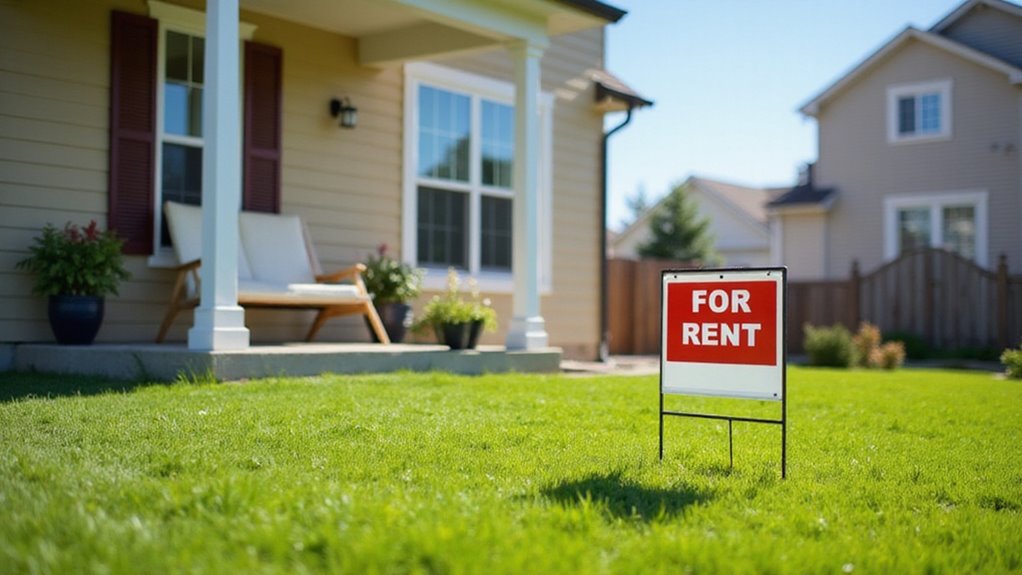At the crossroads of homeownership, many find themselves torn between rental income and final goodbyes. Letting go of a cherished home creates emotional turmoil while keeping it demands unexpected responsibilities. Worse still, making the wrong choice could cost thousands in lost opportunities. Our comprehensive guide helps homeowners navigate this complex financial decision with confidence.
Renting your house makes financial sense when property values are rising and rental demand is strong. Selling works better when you need immediate capital or when management responsibilities outweigh potential rental income. Both options come with distinct tax implications and financial outcomes based on your equity position. In this blog I will explore everything related to deciding whether to rent or sell your property.
Key Takeaways
- Evaluate your financial goals, market conditions, and property equity to determine whether renting or selling aligns best with your objectives.
- Consider potential rental income versus immediate cash from a sale, factoring in expenses, taxes, and local market demand.
- Assess the property’s condition, neighborhood trends, and appraisal data to estimate future appreciation or depreciation risks.
- Think about your ability and willingness to manage tenants if renting, or the need for quick cash if selling.
- Use market data and property inspections to make informed decisions about timing, pricing, and maximizing your investment return.
What Factors Should Influence Your Rent vs. Sell Decision?

Financial goals and market conditions are the primary factors in your rent vs. sell decision. Your current equity position and future property value projections matter most. Cash flow potential from rental income should exceed your monthly expenses to make renting worthwhile.
Local tax laws will affect profits from both renting and selling differently. Additionally, consider your property management abilities and willingness to be a landlord.
The condition of your property impacts both rental rates and selling price. Furthermore, timing in the real estate cycle can dramatically affect your returns.
Investment properties must generate at least 1% of purchase price in monthly rent to be profitable.
What Are the Benefits of Selling Your House?

Selling your house offers both financial freedom and reduced responsibility. You receive immediate cash that can be used for other investments or needs. A sale eliminates ongoing maintenance costs and property taxes. The transaction transfers legal ownership completely to the buyer.
Furthermore, selling provides flexibility in changing life circumstances. You can downsize, relocate, or respond to family needs more easily.
Home sales may qualify for capital gains tax exclusions of up to $250,000 for individuals or $500,000 for married couples.
In addition, the process allows you to capitalize on favorable market conditions.
What Are the Advantages of Renting Out Your Property?

Renting your property creates a steady income stream while you maintain ownership. This option offers financial stability through monthly rental payments. Many landlords appreciate the ability to cover mortgage costs while building equity.
Your property continues to appreciate in value over time. Additionally, you retain control over major decisions about your investment. The rental market shows strong demand in most regions.
Rental prices typically rise with inflation, protecting your income from market changes. Many expenses related to rental properties are tax-deductible.
Furthermore, you can hire property managers if you prefer a hands-off approach. This flexibility allows you to adapt as your financial needs change.
How to Determine if Your Property Will Be Profitable as a Rental?
To determine rental profitability, calculate your potential rental yield and analyze local market conditions.
Your property needs to generate enough income to cover all expenses while providing positive cash flow. A good rental yield typically ranges from 5-10% annually.
Location matters significantly for rental success. Properties near employment centers, universities, or transportation hubs attract consistent tenant demand.
Additionally, research historical appreciation rates in your area. The neighborhood’s growth trajectory affects your long-term returns.
Consider all operating costs before making decisions. Monthly expenses include mortgage payments, taxes, insurance, maintenance, and property management fees.
What Are the Hidden Costs of Being a Landlord?
Landlords face numerous expenses beyond monthly rent collection. Property taxes increase regularly without warning. Maintenance repairs occur frequently and often cost more than expected. Insurance premiums typically rise 5-10% annually. Emergency calls require immediate attention, regardless of timing.
Tenant turnover generates significant costs too. You’ll pay for advertising vacancies and screening new applicants. Property upgrades between tenants become necessary to maintain value.
Additionally, legal fees for evictions or disputes can quickly reach thousands of dollars.
Furthermore, property management fees take 8-12% of your rental income if you hire help. Many landlords also underestimate time costs involved with property oversight.
How to Sell Your House Quickly for Cash?
To sell your house quickly for cash, you need to price it competitively and consider offers from cash home buyers who can close fast.
Prepare your home for a swift sale by making necessary repairs and gathering all essential documentation upfront.
Finally, evaluate the terms of cash offers carefully to ensure a smooth, profitable transaction.
Price Your Property Competitively
Set your home price at market value or slightly below to attract cash buyers quickly. Research comparable sales in your neighborhood to determine fair pricing.
Your properly-priced home will generate immediate interest rather than sitting on the market for months. Most cash buyers look for homes priced 10-15% below retail value. This discount compensates them for taking on risk and paying in cash.
Remember that overpricing leads to extended listing times and eventual price cuts. A competitive initial price creates urgency and often results in faster closings.
Many sellers find that a realistic price from the start eliminates lengthy negotiations and repeated showings.
Consider Cash Home Buyers
Cash home buyers purchase properties directly with immediate payment. They offer a faster alternative to traditional real estate sales. You can close deals in days rather than months with these buyers. No repairs or staging are typically required.
Furthermore, these transactions often involve fewer complications. Most cash buyers purchase properties “as-is” without inspections or appraisals. You’ll avoid paying agent commissions in these deals. This approach works well for distressed properties or urgent financial situations.
In essence, cash buyers trade slightly lower offers for speed and convenience. The simplified process eliminates many traditional selling headaches.
Many sellers find this tradeoff worthwhile when circumstances demand quick results.
Prepare Your Home for Quick Sale
Decluttering and deep cleaning instantly showcase your home’s space potential. Rooms appear larger when personal items are removed. Clean surfaces create a positive impression for buyers.
Make repairs before listing to prevent inspection delays later. Fix leaky faucets, broken doorknobs, and cracked tiles immediately.
Most buyers will deduct $2-3 for every $1 in visible repairs needed.
Strategic staging highlights each room’s purpose and potential. Use neutral colors and minimal furniture arrangements.
Consider professional staging services for maximum appeal.
These preparations increase property value while minimizing time on market. As a result, you’ll attract serious buyers quickly.
Gather Necessary Documentation
Collect these essential documents before selling your home for cash: property deed, mortgage statements, tax records, and recent utility bills. Clear title and proof of ownership prevent transaction delays.
Most cash buyers require insurance documentation showing claims history and coverage details. Home equity proof helps establish your selling position.
Prepare for potential tax consequences.
Capital gains tax applies to profits exceeding $250,000 for single filers or $500,000 for married couples. Likewise, market valuation documents support your asking price.
Well-organized paperwork attracts serious cash buyers in Oklahoma City. As a result, you’ll close faster and move on with minimal stress.
Evaluate Cash Offer Terms
Cash offers require careful assessment of price and conditions. Focus first on the total purchase amount, including all fees and extra costs.
Legal complications may cause closing delays. Review any title issues, liens, or easements carefully.
Property inspections can reveal hidden problems that affect your decision.
Statistical data from comparable sales provides crucial market context. These numbers help determine if the offer is fair.
Look for signs of property depreciation that impact value. Structural issues, outdated systems, or neighborhood decline can reduce worth significantly.
Through thorough evaluation, you’ll protect your interests while making profitable decisions.
Close Efficiently
Cash sales close faster than traditional sales. You can typically complete the process in 7-14 days versus 30-45 days with financing.
Work with professionals who specialize in quick transactions. They understand how to navigate paperwork efficiently.
Cash buyers don’t require mortgage approvals, eliminating financing delays and contingencies. Furthermore, these transactions often involve fewer inspections and simpler paperwork.
Prepare all documents in advance to streamline closing day. Additionally, choose a title company experienced with cash transactions for best results.
This preparation saves time and reduces stress during the final steps.
Ready to Make Your Decision? Let Shawn Buys Houses Help!
We can help you decide about your property’s future. Shawn Buys Houses offers guidance on mortgage options and investment strategies.
We show you how to access immediate cash from your property. Our team reduces management headaches while helping maximize your income potential.
Many homeowners struggle with property decisions. Your property could generate up to 30% more value with the right approach.
In addition to this, we provide wealth-building tools tailored to your situation.
First, we evaluate your current position. Then we recommend clear next steps for your specific needs.
Frequently Asked Questions
How Do Local Oklahoma City Laws Impact Rent and Sale Processes?
Oklahoma City laws streamline your rent and sale processes, ensuring clear disclosures and swift transactions. You must comply with landlord, tenant, and property laws, which protect both your investments and tenants, making each step more predictable and secure.
What Are Typical Closing Costs for Selling in Oklahoma City?
You should expect closing costs in Oklahoma City to include agent commissions, title insurance, escrow fees, recording costs, and possibly repairs. Budget approximately 6-10% of your home’s sale price to ensure smooth, profitable transactions.
How Does Property Condition Influence Rental Profitability?
Your property’s condition is the backbone of rental profitability, like a sturdy foundation supporting growth. Keep it well-maintained and updated; it attracts reliable tenants, reduces vacancies, and maximizes income, serving others with quality and care.
Are There Tax Advantages to Renting Versus Selling in Oklahoma?
You get tax deductions on rental expenses, mortgage interest, and depreciation, boosting cash flow and reducing taxable income. Selling provides capital gains exemptions if conditions are met, but rental offers ongoing tax benefits for serving tenants.
What Timeframe Should I Expect for a Quick Sale in Oklahoma City?
In Oklahoma City, expect a quick sale within 14 to 20 days if liens are cleared and disclosures are complete. Act swiftly, provide marketable titles, and meet legal requirements—timing can maximize your profit and serve others efficiently.


